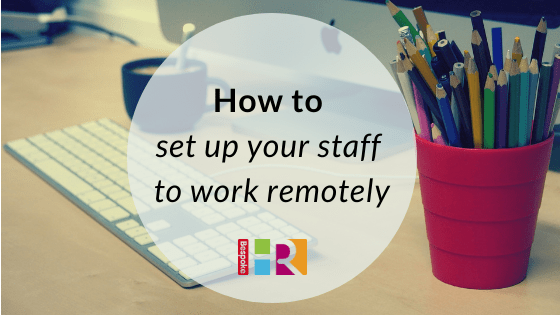As many employers are now adopting a work from home policy, we have put together some remote working guidance for employers.
Equipment and tools
- As an employer it is your responsibility to ensure your team have suitable equipment for home working, so they carry out their work remotely. Any additional costs incurred from working remotely will need to be discussed with the employee (such as phone bills) and how this will work.
- Make sure your IT systems support remote / home working and that your staff have access to team sharing / collaboration tools. Communication can be key to ensure they don’t feel isolated and can stay in touch with the rest of the business.
Creating a safe and productive workspace
- You have a duty of care to your employees whilst they are working from home. Health and safety legislation still applies to homeworkers, and ACAS advises that employers should ensure staff are working in safe environments. As a guide, the HSE has a display screen workstation checklist to help identify any potential risks.
- Encourage your team to find suitable ‘workspace’ in their home which ideally is calm, tidy and away from distractions.
Working hours
- Determine core working hours. In order to keep staff motivated and engaged it’s important to stress the level of expectation despite working from home. Establishing core working hours will help put structure into the day. Set times for meetings and catch ups to keep staff in the loop. This can be done via many video conferencing tools available (see below).
Managing your team remotely
- Consistency is key, so ensure that you have regular catch-ups via phone or video to ensure your team feel supported and clear on what they are doing. This will also help with motivation levels.
- Appreciate that this might be new to some of the team and that it may take some time to find a good way of working remotely.
- Encourage teams to get into good working habits and routines e.g. creating their own workspace, starting and finishing work at similar times to normal, washing and dressing for the work day. It sounds basic but can help give the team structure and promote good mental health.
Welfare and mental health
- Encourage staff to take regular breaks, as they would do in the usual workplace environment, and keep regular contact with the wider business so they don’t feel isolated.
- Find creative ways to engage with your team not just on work matters, for example, share a virtual breaktime together.
Security
- Remind your team of the importance of data security. Sensitive data should be locked away at night, and virus protection across all devices kept up to date.
- Remind your team to use secure networks whilst working, connecting to secure workplace servers. If the work is sensitive, then you must supply the right equipment (such as encrypted laptops etc.).
- Be aware that any cyber or data breaches will be treated in the same way, even if a member of your team is working from home.
- Be aware of scams or phishing emails, there has been an increase in scanners using working from home as a way to get personal or company details.
Useful tools:
- Slack or Microsoft Teams for instant messaging and team communications
- Google Drive or Dropbox for file sharing
- Skype, Google Hangouts or Zoom for conference calls
- Monday.com or Trello for project planning and team collaboration
- Calm has released a number of free resources for anyone feeling anxious.
Get in touch with our team for help on setting up your workforce remotely.
